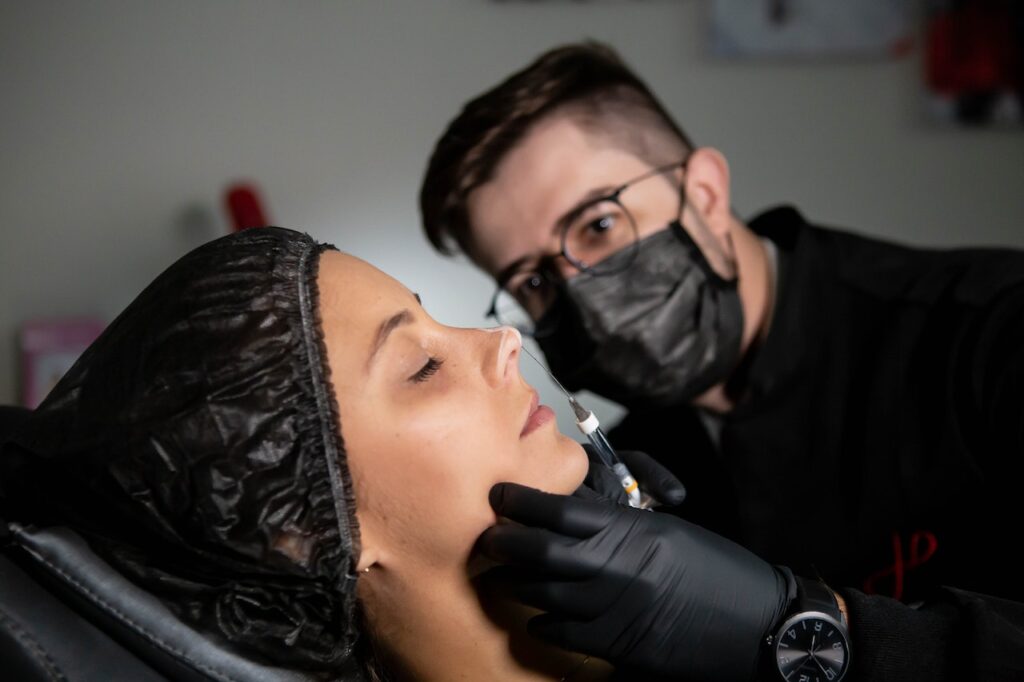Skincare plays a vital role in our overall well-being. Our skin is not only the largest organ in the body but also acts as a protective barrier against external elements. Maintaining healthy skin not only enhances our appearance but also contributes to our self-confidence and overall quality of life. With the abundance of skincare products and treatments available, it can be overwhelming to navigate the options alone. This is where seeking professional guidance becomes crucial.
The purpose of this blog post is to provide valuable insights into two primary skincare professionals: estheticians and dermatologists. By understanding the roles and expertise of each, you can make informed decisions about who to turn to for your specific skincare needs. Whether you’re looking for routine maintenance or addressing specific skin concerns, knowing the difference between these professionals will empower you to make the right choices and achieve optimal results.
Skincare is not a one-size-fits-all approach, and what works for one person may not work for another. Professional guidance is essential because skincare professionals have the knowledge, experience, and training to assess individual skin types, concerns, and conditions. They can provide personalized recommendations, create tailored treatment plans, and guide you towards healthier, more radiant skin.
Table of Contents
In the following sections, we will explore the differences between estheticians and dermatologists, shedding light on their roles, areas of expertise, and the benefits they bring to your skincare journey. By the end of this blog post, you will have a clear understanding of who to turn to based on your specific skincare needs and goals.
Remember, investing in professional skincare guidance is an investment in your overall well-being. Your skin deserves the best care possible, and with the right professional by your side, you can embark on a transformative skincare journey that will leave you feeling confident and radiant.

Esthetician vs. Dermatologist : Education and Training
Estheticians
- Estheticians typically undergo vocational or trade school programs that specialize in skincare. These programs are designed to provide them with the necessary knowledge and skills to perform various skincare treatments and services.
- The duration of training for estheticians can vary depending on the program and the specific requirements set by the regulatory bodies in each region. Generally, esthetician programs can range from several months to a year.
- Esthetician training programs cover a wide range of topics related to skincare. The curriculum often includes courses on basic anatomy and physiology of the skin, skincare techniques, facial treatments, hair removal methods (such as waxing and threading), makeup application, and basic skincare product knowledge. Estheticians may also receive training in spa management and client consultation.
Dermatologists
- Dermatologists take a more extensive educational path that involves medical school and specialized residency training in dermatology. They are medical doctors with a specialization in the diagnosis and treatment of skin conditions.
- The education and training required to become a dermatologist are significantly longer compared to estheticians. After completing a bachelor’s degree, aspiring dermatologists must attend four years of medical school.
- Following medical school, dermatologists undergo a residency program specializing in dermatology. This residency typically lasts three to four years and provides intensive training in various aspects of dermatology, including medical, surgical, and cosmetic dermatology. During their residency, dermatologists gain hands-on experience diagnosing and treating a wide range of skin conditions under the supervision of experienced dermatologists.
Dermatologists acquire a deeper understanding of the skin’s biology, pathology, and the complex interplay between skin health and overall well-being. Their medical education and training enable them to diagnose and treat both common and rare skin conditions, including complex medical cases that require in-depth knowledge and expertise. Estheticians, while knowledgeable in skincare techniques and basic treatments, do not possess the same level of medical training and are not qualified to diagnose or treat medical skin conditions.
Esthetician vs. Dermatologist : Scope of Practice
Estheticians
- Estheticians primarily focus on cosmetic treatments aimed at improving the appearance of the skin. They specialize in enhancing the skin’s texture, tone, and overall aesthetics.
- Estheticians offer a variety of services to their clients, including facials, microdermabrasion, chemical peels, facial massage, waxing, and eyebrow shaping. They may also provide makeup application and skincare product recommendations.
- Estheticians have limitations when it comes to diagnosing and treating medical conditions. While they can recognize common skin issues and make general recommendations for skincare, they are not qualified to diagnose or treat medical skin conditions such as acne, eczema, or skin cancer. If they identify a potential medical concern, they should refer the client to a dermatologist.
Dermatologists
- Dermatologists possess expertise in medical, surgical, and cosmetic dermatology, covering a broad range of skin conditions and concerns.
- They have the knowledge and skills to diagnose and treat various skin conditions, including acne, eczema, psoriasis, dermatitis, skin infections, skin cancer, hair loss, and nail disorders. Dermatologists are trained to identify and address both common and rare dermatological conditions.
- Dermatologists provide accurate diagnoses based on their comprehensive medical knowledge. They develop personalized treatment plans that may include prescribing medications, performing surgical procedures, conducting biopsies, and recommending advanced treatment options such as laser therapy, chemical peels, injectables, or phototherapy. They can also offer guidance on skincare routines, sunscreen use, and lifestyle modifications to improve skin health.
Esthetician vs. Dermatologist : Medical Expertise and Treatment Options
Estheticians
- Estheticians have a solid understanding of skincare products, techniques, and basic skincare routines. They can provide guidance on appropriate skincare products, cleansing techniques, and basic skincare routines tailored to individual skin types.
- Estheticians often focus on non-medical approaches to improve the skin’s appearance, such as exfoliation, hydration, and promoting skin radiance. They may offer advice on lifestyle factors that impact the skin, such as nutrition, stress management, and sun protection.
Dermatologists
- Dermatologists possess in-depth medical knowledge of skin conditions, underlying causes, and treatment options. They can accurately diagnose and differentiate between various skin conditions based on their expertise and diagnostic tools.
- Dermatologists develop personalized treatment plans that address the underlying causes of skin conditions and take into account the individual’s specific needs. They can prescribe medications, such as topical or oral treatments, to manage and control skin conditions effectively.
- Dermatologists have access to advanced treatment options and procedures due to their medical training. They can perform surgical procedures, provide specialized treatments for chronic or severe skin conditions, and offer cutting-edge therapies such as laser treatments, dermal fillers, and chemical peels. This allows them to provide comprehensive care and achieve optimal results for their patients.
Understanding the scope of practice and expertise of estheticians and dermatologists is crucial in selecting the right skincare professional based on your specific needs and concerns. While estheticians excel in cosmetic treatments and basic skincare routines, dermatologists possess the medical expertise required to diagnose and treat a wide range of skin conditions, providing comprehensive care and advanced treatment options.
Esthetician vs. Dermatologist : Safety and Advanced Treatments
Estheticians
- Estheticians primarily utilize cosmetic-grade skincare products in their treatments. These products are formulated to improve the skin’s appearance and provide general skincare benefits.
- Estheticians have limitations when it comes to performing invasive or medical procedures. They are not trained to perform surgical interventions or administer prescription medications.
Dermatologists
- Dermatologists have access to medical-grade treatments and procedures. These treatments are specifically formulated and regulated for medical use, ensuring higher safety standards and efficacy.
- Dermatologists possess the expertise to perform surgical and medical interventions when necessary. They can perform procedures such as skin biopsies, excisions, cryotherapy, and Mohs surgery for skin cancer removal.
- Ensuring the safety and effectiveness of treatments is a top priority for dermatologists. They stay updated on the latest advancements in the field, follow evidence-based guidelines, and adhere to rigorous safety protocols to provide the best possible care to their patients.
Also Read: What is difference between dermatologist and skin specialist
Choosing the Right Skincare Professional : Esthetician vs. Dermatologist
Factors to consider (skin concerns, medical conditions)
When deciding between an esthetician and a dermatologist, several factors should be considered. These include the nature of your skin concerns or conditions, the severity of the issue, and whether it requires medical attention. Additionally, factors such as the desired outcome, budget, and personal preferences can also influence the choice.
When to consult an esthetician
Estheticians are a great choice for routine skincare maintenance, general skin improvement, and cosmetic treatments. If you are seeking relaxation, a facial treatment, or advice on basic skincare routines and product recommendations, an esthetician can provide valuable services.
When to consult a dermatologist
Consulting a dermatologist is recommended when you have specific skin concerns or medical conditions. Dermatologists are equipped to diagnose and treat various skin conditions, ranging from acne and eczema to more complex issues like psoriasis, skin cancer, and hair loss. If you are experiencing persistent or worsening skin problems, have concerning moles or growths, or require medical-grade treatments, consulting a dermatologist is the best course of action.
Importance of personalized care and expertise
Every individual’s skin is unique, and proper skincare requires personalized care and expertise. Both estheticians and dermatologists play important roles in skincare, but their areas of expertise and scope of practice differ. Estheticians can provide general skincare services and basic advice, while dermatologists possess specialized medical training, enabling them to diagnose and treat a wide range of skin conditions. Choosing the right professional based on your specific needs ensures that you receive the most appropriate and effective care for your skin.
Understanding the differences between estheticians and dermatologists is crucial in making informed decisions about skincare. Estheticians excel in cosmetic treatments and routine skincare maintenance, while dermatologists possess the medical expertise and training to diagnose and treat various skin conditions. Prioritizing skin health involves considering factors such as the nature of your concerns, the need for medical intervention, and the desired outcomes. By seeking the appropriate skincare professional, you can receive personalized care, access advanced treatments, and ensure the safety and effectiveness of your skincare journey.
Take the first step towards healthier, more vibrant skin by scheduling a consultation at Skin Rehab Clinic. Our dedicated team is ready to assess your needs, address your concerns, and develop a personalized treatment plan to help you achieve the skin you’ve always desired.

“”Dr. Nidhi Paliwal, MBBS, MD( Dermatology), specializes in problems of skin, hair & various cosmetic issues. Her strong traits include passion to help and emotional endurance, she understands how deep dermatologic and cosmetic concerns can affect an individual and is always ready to work with the patients to bring out the best results. Doctor Nidhi Paliwal has presented many papers and posters at various national conferences and has also won awards for best paper presentation.”